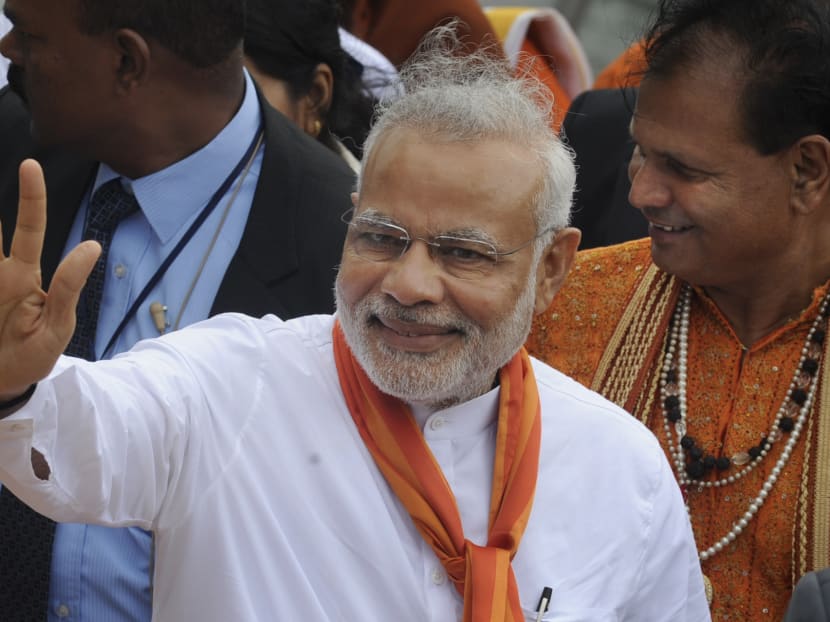Modi sees shiny cities in India’s future
NEW DELHI — If all goes according to plan in a city that Prime Minister Narendra Modi is building, human excrement will travel faster than most Indian trains. This is either an indication of how advanced Mr Modi’s vision is or how backward Indian reality is.

India's Prime Minister Narendra Modi waves during a visit to the crater lake of Grand Bassin (also known as Ganga Talao) during the second day of his visit to the Republic of Mauritius. Photo: AP
NEW DELHI — If all goes according to plan in a city that Prime Minister Narendra Modi is building, human excrement will travel faster than most Indian trains. This is either an indication of how advanced Mr Modi’s vision is or how backward Indian reality is.
The project in question is a “smart city”, a concept that is very dear to Mr Modi and unclear to Indians who have tried to find out what exactly it does.
A smart city, it appears from the government’s sketches, is a cluster of high-rise buildings that shine in daylight and glow at night, and loom over waterways and handsome trains that have automatic doors.
A smart city would be run and managed by software that would, among other things, suck human waste from buildings and send it at high speed to some other place.
Mr Modi plans to build scores of smart cities and hundreds of other cities that are only marginally dumber. He also wants to develop many industries.
He wants the world to “make in India”. India’s chief economic adviser, Mr Arvind Subramanian, has conveyed to him the hypothesis that agriculture is useless in enriching Indians. The economy should instead focus on providing low-skilled manufacturing jobs to absorb millions of poor young Indians who are fit to work.
To achieve all this, Mr Modi’s government needs a lot of land from Indian farmers. It is a messy process. He appears to know how messy it can be. Once, in a speech to Delhi’s elite, he expressed his amusement at the memory of a bunch of automobile executives who went to acquire land from farmers, “wearing ties and suits”. They were driven away.
He is pushing legislation that would make it easier to acquire land for public and private projects. There is much political and intellectual opposition to this, because it would be a potent and transformative measure.
Historically, when Indian governments have set out to acquire land, they have been viewed as corrupt and exploitative, the pimps of private firms. Something inside farmers, humanitarians, political economists and tradition lovers combusts at the combination of the words “land” and “acquisition”.
The previous government passed an Act in 2013 that would require the consent of 70 per cent to 80 per cent of landowners, depending on what the land was to be used for, before any acquisition by the government or a private company. The Act also mandated an assessment of the project’s impact on those who are not the owners of the land but are dependent on it.
The Modi government is attempting to amend this Act. For some types of projects, the government wants to eliminate the requirement for the consent of landowners and the impact assessment. This would speed up land acquisition. At the heart of the new Bill is the notion that few Indians want to be farmers anymore and that landless farm labourers are better off working in the new economies that the new projects would create.
Indian agriculture, despite all the homage that is paid by city dwellers to farmers, is mostly land aspiring to become real estate. Farming is the least productive industry in India, and farmers are among its most impoverished labourers.
According to a study last year of farmers by the Centre for the Study of Developing Societies, 62 per cent of farmers surveyed wished to quit farming and move to the city, and 76 per cent of their children did not wish to be farmers.
The intellectuals and activists who oppose the government’s plans for efficient land acquisition despise the idea that anyone should be forced to sell his land and that hundreds of thousands of landless farmworkers should suddenly be asked to choose another profession. They accuse the government of being the enemy of the poor farmer. But it appears that Mr Modi’s instinct tells him he has much to gain from those sketches of big gleaming things coming to life. THE NEW YORK TIMES





